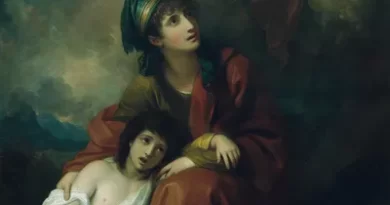The story of ruth and naomi return to judah from moab – रूत और नाओमी की मोआब से यहूदा लौटने की कहानी
The story of Ruth and Naomi’s return to Judah from Moab is a beautiful tale of loyalty, love, and faithfulness, which is found in the Book of Ruth in the Old Testament.
Naomi, her husband Elimelech, and their two sons, Mahlon and Chilion, were originally from Bethlehem in Judah. Due to a famine in the land, they moved to the neighboring country of Moab in search of better living conditions. While in Moab, tragedy struck: Elimelech died, leaving Naomi with her two sons. The sons eventually married Moabite women—Orpah and Ruth.
After some time, both of Naomi’s sons, Mahlon and Chilion, also died, leaving Naomi alone without her husband or children. She was left with her two Moabite daughters-in-law, Orpah and Ruth. Naomi, now burdened with grief and hardship, decided to return to her homeland of Judah upon hearing that the Lord had blessed the land of Judah with food once again.
Naomi encouraged her daughters-in-law to return to their own families in Moab, hoping they could find new husbands and start over. She blessed them and thanked them for their kindness and loyalty. After initial hesitation, Orpah eventually returned to her family. Ruth, however, displayed an unwavering loyalty and refused to leave Naomi.
Ruth’s devotion to Naomi is encapsulated in her famous words: “Do not urge me to leave you or to turn back from you. Where you go, I will go, and where you stay, I will stay. Your people will be my people and your God my God. Where you die, I will die, and there I will be buried. May the Lord deal with me, be it ever so severely, if even death separates you and me.” (Ruth 1:16-17) Moved by Ruth’s commitment, Naomi accepted her companionship, and together, they traveled back to Bethlehem.
When Naomi and Ruth arrived in Bethlehem, Naomi’s old friends and neighbors recognized her and were surprised to see her after so many years. Naomi, who was still heartbroken from her losses, asked them to call her Mara, meaning “bitter,” instead of Naomi, which means “pleasant,” as she felt the Lord had made her life bitter. The people of Bethlehem welcomed Ruth despite her being a Moabite, a foreigner, because of her loyalty and love for Naomi.
Ruth and Naomi’s return marked the beginning of God’s plan to care for them. Ruth, who worked in the fields to support Naomi, eventually met Boaz, a wealthy and kind landowner. Boaz was a relative of Naomi’s husband and could serve as a kinsman-redeemer, someone who could marry Ruth to continue the family line. Ruth and Boaz’s marriage not only restored Naomi’s hope and security but also fulfilled a larger purpose: Ruth became the great-grandmother of King David, placing her in the genealogy of Jesus Christ.
Faith and Loyalty: Ruth’s dedication to Naomi showcases the power of faithfulness and loyalty. Her decision to adopt Naomi’s people and God as her own displays a deep commitment that God honors. God’s Providence: This story is a reminder that God has a purpose for everyone, regardless of their background, and that He often brings about redemption and hope through seemingly small acts of love and faith. The Power of Kindness and Family Bonds: Ruth and Naomi’s story highlights the strength of family bonds and kindness in hardship.
The story of Ruth and Naomi ultimately foreshadows God’s plan for redemption, making it a deeply inspiring story of faith, resilience, and divine love.
The story of ruth and naomi return to judah from moab –
रूत और नाओमी की मोआब से यहूदा लौटने की कहानी



